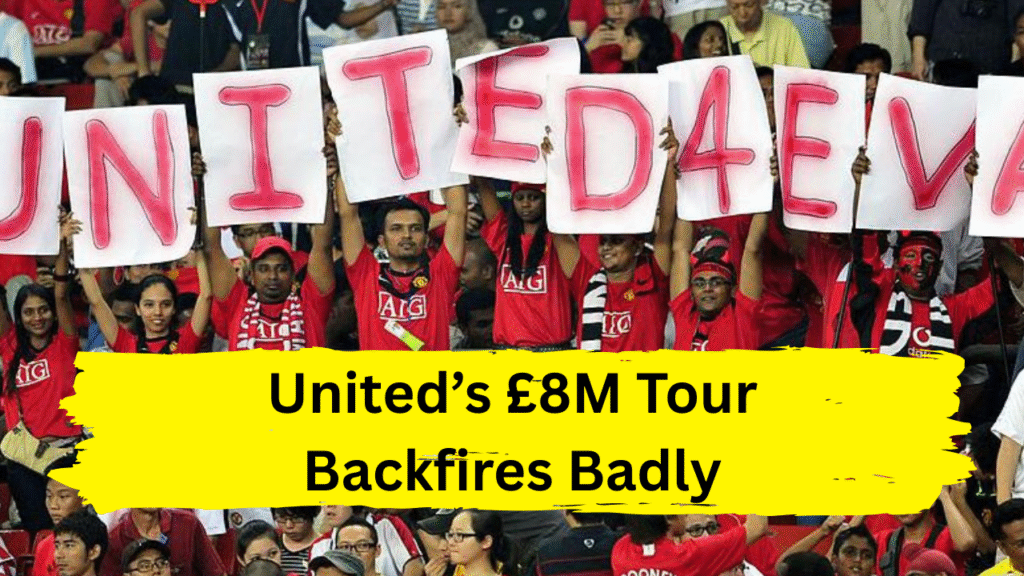The monsoon rains that lashed Kuala Lumpur’s Bukit Jalil Stadium after the final whistle felt like nature itself weeping for Manchester United’s dignity. As the ASEAN All-Stars—a patchwork squad of Southeast Asian journeymen—celebrated their 1-0 victory, the Premier League giants trudged off beneath a cacophony of boos. This was no ordinary friendly defeat. It was a corporate strategy imploding in real-time: a £8 million Asian tour designed to heal financial wounds instead becoming a global showcase of institutional decay .
The Faustian Bargain: Revenue vs. Relevance
United landed in Malaysia hours after their worst Premier League finish since 1974—a 15th-place collapse that manager Ruben Amorim bluntly termed a “disaster season” . The tour’s rationale was nakedly commercial: two friendlies (against ASEAN All-Stars and Hong Kong) promising £8 million in critical revenue . Chief Executive Omar Berrada framed it as “respecting the global fanbase,” yet tickets remained unsold days before kickoff . The club’s desperation was palpable: a quick financial fix trumped player welfare amid 71% humidity and 31°C heat that left even warm-up drills resembling endurance trials .
What transpired was a tactical surrender. Amorim made sixteen substitutions, fielding 27 players in a disjointed spectacle that shattered any pretense of competitive integrity. Bruno Fernandes and Alejandro Garnacho entered at halftime to rescue pride, yet their presence only magnified the farce. Garnacho, fresh from Amorim’s public rebuke (“Pray you find another club”), moved like a ghost in a system he no longer recognized . Fernandes, distracted by a looming £200 million Saudi offer, delivered aimless volleys into the stands . The goal itself—a surgical finish by Myanmar’s Maung Maung Lwin, a Thai League striker with two seasonal goals—felt like cosmic mockery of United’s £1.5 billion post-Ferguson spending .
The Irony of “Charity”
Billed as a celebration of ASEAN unity, the match’s charitable veneer cracked under the weight of United’s humiliation. Proceeds supported Yayasan Al Sultan Abdullah, yet the optics were catastrophic: a club extracting £8 million from developing markets while being out-tackled by Malaysia’s “Sergio Aguero” (a local fullback) and outwitted by Singapore’s “João Pedro” (a midfield workhorse) . As The Metro noted, ASEAN’s squad was initially formed in 2014 to aid Typhoon Haiyan victims—making United’s lifeless performance feel like an insult to the spirit of goodwill .
Fan reactions distilled the fallout:
- “Embarrassing” trended globally as supporters lambasted the “cynical cash grab” .
- Travelling ultras booed Amorim at full-time, their fury amplified by Garnacho’s alienation and Fernandes’ imminent Saudi departure .
- Rival fans reveled in memes comparing the loss to non-league defeats, erasing decades of United’s aura in 90 minutes .
Berrada’s pre-match admission now rings prophetic: “We made tough decisions this season” . None may prove costlier than this tour.
The Reputation Tax
United’s Asian expedition exposes football’s existential tension: clubs as global brands versus sporting institutions. Historically, tours like the 2009 Malaysia visit reinforced mythology—Beckham’s aura, Ferguson’s gravitas. Today, they spotlight decay. Consider:
- Commercial partners recoil as the “United brand” becomes synonymous with chaos. Barcelona’s sudden meeting with Marcus Rashford’s agent post-defeat felt like vultures circling .
- Player value evaporates: Rasmus Hojlund’s “sapped confidence” (noted by the Mirror) and Casemiro’s “finished” appearance degrade assets worth £200 million combined .
- The Glazer ownership faces renewed fury: Tour proceeds won’t offset the reputational tax paid in sponsorships lost and prestige burned .
Amorim’s post-match press conference in Kuala Lumpur oozed denial. “No injuries… we move on,” he shrugged, ignoring the metastasizing rot . His plea for fans to “wait for next season” felt tragically hollow as monsoon rains flooded the stadium exits .
Epilogue: The Tour’s Poisoned Legacy
As United limped toward Hong Kong for Friday’s final friendly, the tour’s legacy crystallized: a £8 million gain dwarfed by incalculable reputational damage. Southeast Asia didn’t witness a football match; it saw a dystopian parable. A club that once conquered continents now loses to part-time opponents in charity games. A locker room fractured by public ultimatums. A fanbase whose loyalty is exploited as a revenue stream .
The Bukit Jalil roar that hailed ASEAN’s triumph wasn’t just joy—it was the sound of a footballing empire’s credibility shattering. United’s Asian tour didn’t just backfire; it revealed a truth no amount of tour revenue can fix: when a club prioritizes commerce over cohesion, even “friendly” matches become acts of self-immolation. The £8 million will be spent. The humiliation is permanent.


